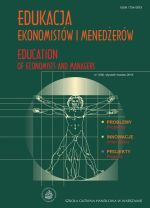Treść głównego artykułu
Abstrakt
The article presents, in a synthetic way, the results of studies and reports concerning generation Y, in particular in relation to students and their specific attitudes and expectations in terms of work, employers and professional career. This article is also a voice in discussion on the homogeneity of this generation as well as on the difference scale between young people entering the labour market and older employees within the context of the debate on that issue, taking place in the scientific literature and social and economic life. Based on presented study results, conclusions of applicable nature have been arrived at, which are important from the perspective of how to effectively manage and motivate young people entering the labour market.
Szczegóły artykułu
Autor (Autorzy) artykułu oświadcza, że przesłane opracowanie nie narusza praw autorskich osób trzecich. Wyraża zgodę na poddanie artykułu procedurze recenzji oraz dokonanie zmian redakcyjnych. Przenosi nieodpłatnie na Oficynę Wydawniczą SGH autorskie prawa majątkowe do utworu na polach eksploatacji wymienionych w art. 50 Ustawy z dnia 4 lutego 1994 r. o prawie autorskim i prawach pokrewnych – pod warunkiem, że praca została zaakceptowana do publikacji i opublikowana.
Oficyna Wydawnicza SGH posiada autorskie prawa majątkowe do wszystkich treści czasopisma. Zamieszczenie tekstu artykuły w repozytorium, na stronie domowej autora lub na innej stronie jest dozwolone o ile nie wiąże się z pozyskiwaniem korzyści majątkowych, a tekst wyposażony będzie w informacje źródłowe (w tym również tytuł, rok, numer i adres internetowy czasopisma).
Osoby zainteresowane komercyjnym wykorzystaniem zawartości czasopisma proszone są o kontakt z Redakcją.
![]()
Referencje
-
1. ACCA, Generation Y. Realising the Potential, 2010, http://www.accaglobal.com
2. Akademickie Mazowsze 2030, Foresight „Akademickie Mazowsze 2030” Raport końcowy, 2012, http://www.akademickiemazowsze2030.pl.
3. Bilans Kapitału Ludzkiego (BKL), Aktywność zawodowa Polaków, 2012, http://bkl. parp.gov.pl.
4. Bilans Kapitału Ludzkiego (BKL), Pracodawcy o rynku pracy, 2012, http://bkl.parp. gov.pl.
5. Bilans Kapitału Ludzkiego (BKL), Studenci – przyszłe kadry polskiej gospodarki, 2011, http://bkl.parp.gov.pl.
6. Cennamo L., Gardner D., Generational differences in work values, outcomes and person-organisation values fit, “Journal of Managerial Psychology” 2008, 23.
7. Deloitte, First steps into the labour market, 2013, http://www.deloitte.com.
8. Kenexa High Performance Institute, Attitude. What Attitude. The Evidence Behind the Work Attitudes of Millennials, 2011, http://khpi.com.
9. Pocztowski A., Rosnące znaczenie talentów w gospodarce, in: Zarządzanie talentami w organizacji, red. A. Pocztowski, Wolters Kluwer Polska, Kraków 2008.
10. PWC, Millennials at work reshaping the workplace, 2011, http://www.pwc.com.
11. Real K., Mitnick A.D., Maloney W.F., More similar than different: Millennials in the U. S. building trades, “Journal of Business and Psychology” 2010, 25.
12. Tilburg University – Faculty of Social and Behavioural Sciences, European Value Study, http://www.europeanvaluesstudy.eu.
13. Twenge J.M., A review of the empirical evidence on generational differences in work attitudes, “Journal of Business and Psychology”, 2010, 25(2).
14. Twenge, J. M., Campbell, S. M., Hoffman, B. R., Lance, C. E., Generational Differences in Work Values: Leisure and Extrinsic Values Increasing, Social and Intrinsic Values Decreasing, “Journal of Management” 2010, 36.
15. University of Michigan – Institute for Social Research, Monitoring the Future, http:// www.monitoringthefuture.org.
16. Universum, Universum Student Survey 2012, 2012, http://www.universumglobal. com.
17. Strategic Advisor Team of the Prime Minister, Reports Młodzi 2011 oraz Polska 2030, http://zds.kprm.gov.pl.
Referencje
2. Akademickie Mazowsze 2030, Foresight „Akademickie Mazowsze 2030” Raport końcowy, 2012, http://www.akademickiemazowsze2030.pl.
3. Bilans Kapitału Ludzkiego (BKL), Aktywność zawodowa Polaków, 2012, http://bkl. parp.gov.pl.
4. Bilans Kapitału Ludzkiego (BKL), Pracodawcy o rynku pracy, 2012, http://bkl.parp. gov.pl.
5. Bilans Kapitału Ludzkiego (BKL), Studenci – przyszłe kadry polskiej gospodarki, 2011, http://bkl.parp.gov.pl.
6. Cennamo L., Gardner D., Generational differences in work values, outcomes and person-organisation values fit, “Journal of Managerial Psychology” 2008, 23.
7. Deloitte, First steps into the labour market, 2013, http://www.deloitte.com.
8. Kenexa High Performance Institute, Attitude. What Attitude. The Evidence Behind the Work Attitudes of Millennials, 2011, http://khpi.com.
9. Pocztowski A., Rosnące znaczenie talentów w gospodarce, in: Zarządzanie talentami w organizacji, red. A. Pocztowski, Wolters Kluwer Polska, Kraków 2008.
10. PWC, Millennials at work reshaping the workplace, 2011, http://www.pwc.com.
11. Real K., Mitnick A.D., Maloney W.F., More similar than different: Millennials in the U. S. building trades, “Journal of Business and Psychology” 2010, 25.
12. Tilburg University – Faculty of Social and Behavioural Sciences, European Value Study, http://www.europeanvaluesstudy.eu.
13. Twenge J.M., A review of the empirical evidence on generational differences in work attitudes, “Journal of Business and Psychology”, 2010, 25(2).
14. Twenge, J. M., Campbell, S. M., Hoffman, B. R., Lance, C. E., Generational Differences in Work Values: Leisure and Extrinsic Values Increasing, Social and Intrinsic Values Decreasing, “Journal of Management” 2010, 36.
15. University of Michigan – Institute for Social Research, Monitoring the Future, http:// www.monitoringthefuture.org.
16. Universum, Universum Student Survey 2012, 2012, http://www.universumglobal. com.
17. Strategic Advisor Team of the Prime Minister, Reports Młodzi 2011 oraz Polska 2030, http://zds.kprm.gov.pl.
